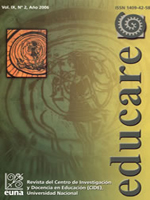La metacognición como estrategia para detectar procesos cognitivos en niños con retraso mental
DOI:
https://doi.org/10.15359/ree.9-2.8Keywords:
metacognition, metacognitive strategies, cognitive structures and processes, information processing, math problem solving, mental retardationAbstract
Abstract. It was planned to detect the cognitive processes that mentally retarded children used when solving math problems, through the use or metacognitive strategies. The work was done whit a sample of twenty mentally retarded children that attend integrated classrooms from de provinces of Heredia and Alajuela. An instrument called Batería de Resolución de Situaciones Matemáticas (BARSIMAR) was used to detect the cognitive processes that children used when working with metacognitive strategies. The results show that the more cognitive engaged the children are, the more difficulty they will have when using cognitive processes to register the information in the short term memory. The advanced kids could use the processes in a better way, but with interferences and difficulty to recover the information form the long term memory and give correct answers to the cognitive task they are working on.
References
Acle, G. y Olmos, A. (1998). Problemas de Aprendizaje. Enfoques Teóricos. Segunda edición. México D.F.: Universidad Autónoma de México.
Bañuelos, A. (2002). Resolución de Problemas Matemáticos en Estudiantes de Bachillerato. En línea http://www.cesu.unam.mx/iresie/revistas/perfiles/perfiles-ant/
-6.htm
Barquero, D., González, E., Navarro, F. y Vázquez, P. (1997). El Programa de Comunicación Total de Schaeffer y Colaboradores ( 1982): "Habla signada" como un sistema alternativo en la enseñanza del lenguaje en niños con retraso mental no verbales. Seminario de Graduación, Universidad Nacional, Heredia.
Cordero, M., Duarte, L., Fuentes, O., López, N. y Vida!, M. (1997). La Resolución de Problemas para el Aprendizaje de las Matemáticas. Seminario, Universidad Nacional, Heredia, Costa Rica.
Dockrell, J. y McShane, J. (1997). Dificultades de Aprendizaje en la Infancia. Barcelona, España: Ediciones Paidós Ibérica.
Escudero, C. (2002). Los Procedimientos en Resolución de Problemas de Alumnos de 3 ° Año: Caracterización a través de Entrevistas. San Juan, Argentina. En línea http://www.if.ufrgs.br/public/ensino/N3/proced.htm
García, M., Montero, S., Romero, C. y Salvador, L. (1996). Evaluación Psicosocial del Retraso Mental, Conceptos, Metodología e Instntmentos. Grupo de Investigación en Medicina Psicosocial. Universidad de Cádiz. Madrid, España: Ediciones
Ministerio de Asuntos Sociales.
González, F. (s.f.). Metacognición y Tareas Intelectuales Existentes. El Caso de la Resolución de Problemas Matemáticos. En línea: http://www.lite.fae.unicamp.br/grupos/matema/zete/Z9 fredy.html
Klinger, K. (1999). Psicología Cognitiva: Estrategias en la Práctica Docente. España: Espasa-Calpe.
Moya, J. (2000a). Estrategias Metacognitivas de Educación Especial. Pontificia Universidad Católica de Chile. Santiago: PUC.
Moya, J. (2000b). Estrategias Metacognitivas y Dificultades del Aprendizaje. Pontificia Universidad Católica de Chile. Santiago: PUC.
Salduondo, J. (2000). Entre lo Visible y lo Enunciable. El Libro de Texto en la Escuela Básica Chilena. Algunos Lineamientos Estratégicos para Incidir en el Mejoramiento de las Prácticas Educativas. Seminario de Investigación para obtener el grado de Magíster. Pontificia Universiqad Católica de Chile.
Thornton, S. (2000). La Resolución Infantil de Problemas. Segunda edición. Madrid, España: Ediciones Morata.
Verdugo, M. (1994). Personas con Discapacidad, Perspectivas Psicológicas y Rehabilitadoras. Madrid, España: Editorial Siglo XXI. ·
Vizcarra, R. ( 1999). Teoría Fundada: Codificación Abierta y Análisis Comparativo. Pontificia Universidad Católica de Chile, Facultad de Educación.
Downloads
Published
How to Cite
Issue
Section
License
1. In case the submitted paper is accepted for publication, the author(s) FREELY, COSTLESS, EXCLUSIVELY AND FOR AN INDEFINITE TERM transfer copyrights and patrimonial rights to Universidad Nacional (UNA, Costa Rica). For more details check the Originality Statement and Copyright Transfer Agreement
2. REUTILIZATION RIGHTS: UNA authorizes authors to use, for any purpose (among them selfarchiving or autoarchiving) and to publish in the Internet in any electronic site, the paper´'s final version, both approved and published (post print), as long as it is done with a non commercial purpose, does not generate derivates without previous consentment and recognizes both publisher's name and authorship.
3. The submission and possible publication of the paper in the Educare Electronic Journal is ruled by the Journal’s editorial policies, the institutional rules of Universidad Nacional and the laws of the Republic of Costa Rica. Additionally, any possible difference of opinion or future dispute shall be settled in accordance with the mechanisms of Alternative Dispute Resolution and the Costa Rican Jurisdiction.
4. In all cases, it is understood that the opinions issued are those of the authors and do not necessarily reflect the position and opinion of Educare, CIDE or Universidad Nacional, Costa Rica. It is also understood that, in the exercise of academic freedom, the authors have carried out a rogorous scientific-academic process of research, reflection and argumentation thar lays within the thematic scope of interest of the Journal.
5. The papers published by Educare Electronic Journal use a Creative Commons License:















 The articles published by Educare Electronic Journal can be shared with a Creative Commons License:
The articles published by Educare Electronic Journal can be shared with a Creative Commons License: 



